
It seems every culture has a recipe for dough wrapped around something delicious, and then boiled. My own forbears, the Mennonites, have a delicious dough wrapped creation called wereneke (or vereneke, vereneki - pronounced VURR-REN-NEH-KUH - roll the r's). It is much like the Ukrainian pyrogi (pirogi, pirogy, pyrogy), but in my unbiased opinion, wereneke is much more delicious.
When I was in college, I worked in the summer in a small town in Western Canada that has a large Mennonite population (including members of my extended family). I felt very welcome there. My best friend also lived there with me, so when I was invited over for family dinner, my family would invite him also. Well he had had Ukrainian pyrogi before, and to make him feel comfortable, my aunt made him Ukrainian-style pyrogi, and made wereneke for me. Well imagine all of our surprise when he said, "The pyrogis are okay, but the wereneke are awesome." I felt terrible for my poor aunt. She'd put all that effort into the pyrogis, because she had assumed my friend wouldn't enjoy the wereneke. Everyone had preferred the wereneke. But I didn't want her to feel she had wasted her time, so I piped up, "Oh, I think the pyrogis are great!". My mistake. Forever after, when she made dinner for me or my family, she would include some pyrogis. And I would dutifully eat some and smile, knowing she had made them specifically for me. The things she (and I) did for love...
Wereneke is one of my favourite foods on earth. But it's not just because they're delicious. It's also the communal aspect of working together to make a delicious meal. Everyone knows there part. My wereneke-folding skills have surprised Chinese and Italian friends as well, when they discover I can fold dumplings and tortellini with the best of them.
Here we go. For the dough:
2 C flourMix the dough ingredients. You don't want the dough to be soft, and rollable with a rolling pin, but you don't want it too dry. If you dry it out too much, the wereneke won't fold closed.
1 tsp salt
½ cup milk
½ cup light cream (or ⅛ C butter and ½ C milk)
3 egg whites (or substitute 1 egg for 2 egg whites)

Roll out the dough, and cut into squares. Use only enough flour to keep it from sticking to the dough.
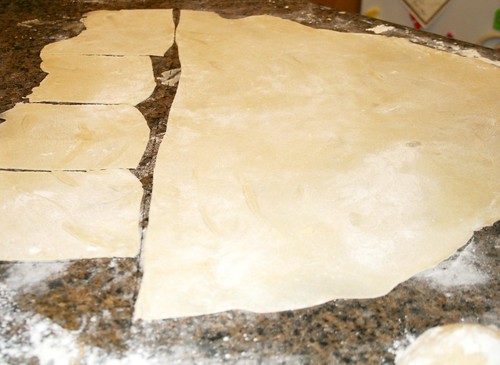
Meanwhile, make the filling.
1 lb dry cottage cheese
2 egg yolks
salt to taste
pinch cinnamon
Dry cottage cheese can beextremely challenging to find, so you can substitute farmer's cheese if you must (or chenna, even). I hope to learn to make my own some day. But until then, there are substitutes.

Mix the cottage cheese with the other ingredients.
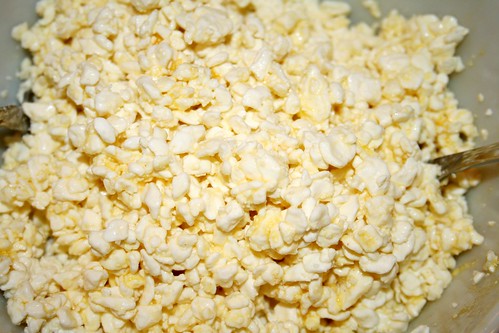
Put a small amount of filling in the middle of a 2 ½" x 2 ½" square of dough. Be careful to keep the edges clean, as it will make it difficult to close.
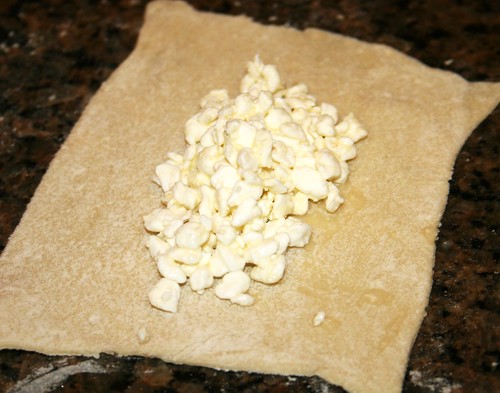
Fold the corners over diagonally to make a triangle, and pinch the edges shut. You have to seal them well, or they'll open when cooking.

Keep the folded wereneke on a lightly floured cookie-sheet until you have enough for a full meal. Keep folding.
Also, make some rhubarb wereneke. These are simpler. You merely fold them shut with a spoonful of sugar and half a spoonful of flour - you want to make sure again that you don't get any sugar or flour in the edges of the wereneke, or it won't close.

Now, start a whole big pot boiling. Cook the rhubarb and cottage-cheese wereneke separately, as they have different cooking times. When you get the pot going to a rolling boil, toss in a dozen or so wereneke, gently, so as not to tear them open.

The cottage cheese wereneke are done as soon as the water is boiling again. The rhubarb ones require a few minutes to cook through (more if you use frozen rhubarb).
Cottage cheese wereneke will look like this:
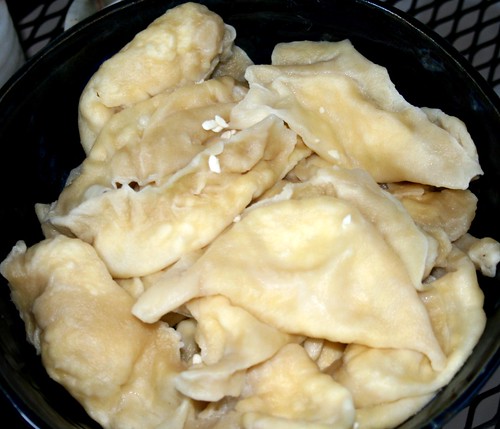
Rhubarb wereneke will look like this:
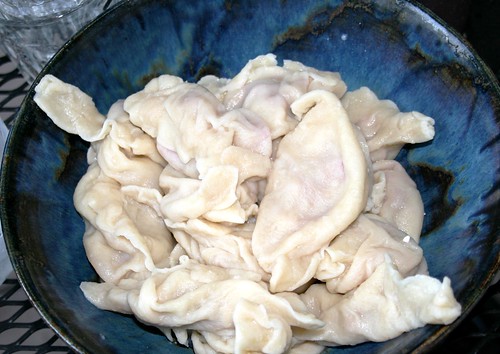
While you do a few batches, you can make the sauce:
½ C butter
1 C sour cream
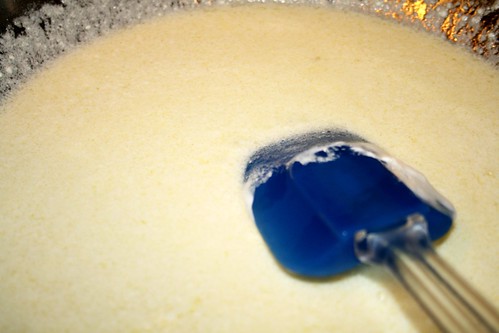
Serve liberally sauced:
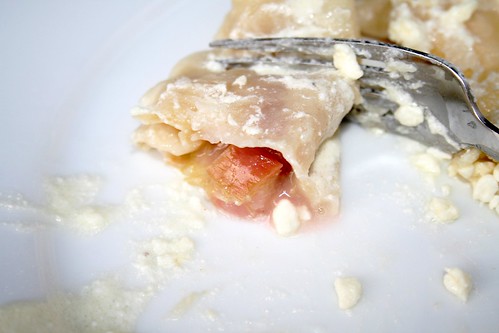
Delicious!

1 comment:
Great lesson there. I can try them now!
Post a Comment